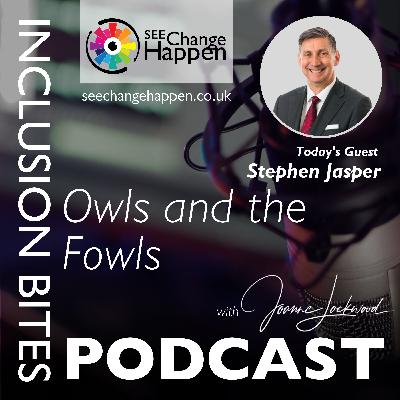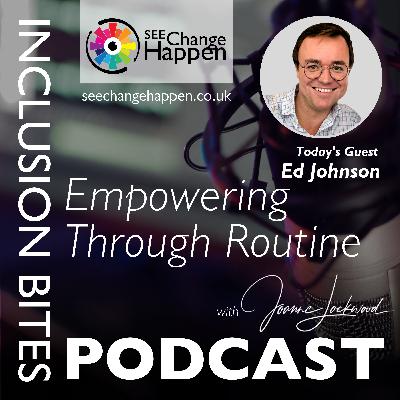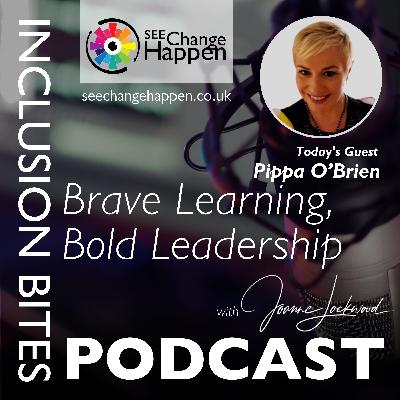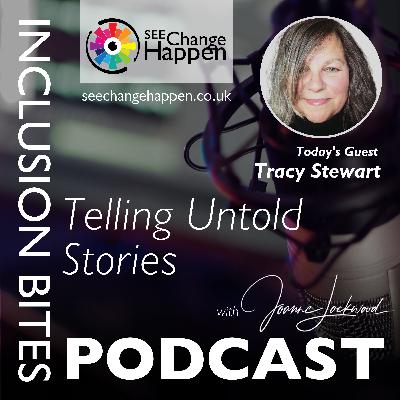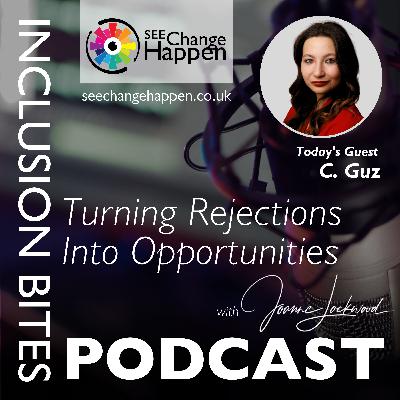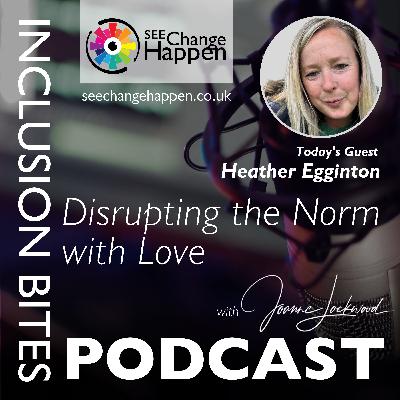Building Bridges in a Biased World
Description

Neurodiversity, Identity, and Breaking Stereotypes in Male-Dominated Industries
Sonia Prérez explores the realities of navigating intersectionality, neurodiversity, and authentic leadership, revealing how building supportive networks fosters inclusion, resilience, and genuine psychological safety within a biased world.
In this episode of The Inclusion Bites Podcast, Joanne Lockwood explores the realities of building bridges in a biased world with guest Sonia Pérez. They uncover the subtle and overt barriers that neurodivergent and minoritised people face in traditionally male-dominated sectors, particularly engineering and energy. Sonia offers candid reflections on navigating complex identities, masking in the workplace, and the intersection of motherhood, neurodiversity, and professional ambition. The conversation tackles how internalised expectations shape confidence, strategies for thriving amid microaggressions, and the persistent, unseen labour of adapting to workplace culture. Joanne and Sonia underscore the critical role of network and community—'finding your village'—in fostering psychological safety and personal resilience.
Sonia Prez is an engineer and accomplished leader within the energy industry. Now based in Aberdeen, she is a committed champion of diversity, equity, and inclusion. With lived experience as a neurodivergent, single mother and professional, Sonia actively advocates for the importance of psychological safety and belonging in STEM. Her journey into DEI was spurred not only by professional insight but by personal developments—her daughter’s neurodivergence prompting Sonia’s own diagnosis and rapid learning curve. Beyond her technical expertise, Sonia has chaired women’s and neurodiversity networks, contributed to sector-wide discussions, and holds master’s degrees in both engineering and creative writing.
Throughout the episode, Joanne and Sonia discuss the nuanced reality of fitting in, the limitations of masking, and why systemic change is necessary for authentic inclusion. They highlight evolving generational perspectives, the ongoing challenges for working parents, and the value of open conversations about mental health, eating disorders, and intersectionality. Sonia’s advice emphasises the importance of building supportive networks, taking up space, and not internalising societal bias.
A key takeaway from this episode is the transformative power of embracing and sharing lived experience to drive inclusive leadership and culture change. Listeners are encouraged to reflect on their own identities, leverage supportive communities, and continue challenging the status quo as we strive for a workplace—and society—where everyone can truly belong and thrive.
Shownotes:
AI Extracts and Interpretations
The Inclusion Bites Podcast #169 Building Bridges in a Biased World
Other Links
SEE Change Happen: The Inclusive Culture Experts
— seechangehappen.co.uk
Inclusion Bites Podcast on YouTube
Clips and Timestamps
Navigating Sexism at Work: “There’s always this kind of, well, sexist jokes and you kind of have to laugh with them and it’s not really funny, but I don’t know, sometimes you can become an object.”
— Sonia Pérez [00:07:03 → 00:07:12 ]
Building Your Support Network: “The first thing would be to build her village. That’s going to be really key because there’s always going to be people who will want to see her fail.”
— Sonia Pérez [00:11:08 → 00:11:16 ]
Viral Topic: Similarities Between Giftedness, ADHD, and Autism “giftedness, ADHD and autism have very similar traits, actually. And I didn’t, I knew nothing about that.”
— Sonia Pérez [00:17:25 → 00:17:34 ]
ADHD in Women and Misunderstood Intelligence: “I got my diagnosis and I was really surprised to see that not only I had adhd, but I was gifted.”
— Sonia Pérez [00:18:15 → 00:18:20 ]
Navigating Neurodiversity Overlap: “It’s a bit difficult knowing where, you know, the, the autism, ADHD and giftedness kind of ends to start where the other one begins.”
— Sonia Pérez [00:18:51 → 00:19:39 ]
Strengths Beyond Numbers: “I’m really good with abstract thinking. I’m really good with empathy, for example, like talking to people, understanding what’s important to each person and building that trust.”
— Sonia Pérez [00:20:06 → 00:20:18 ]
Neurodivergence and Gender: “there is a very clear link with my Neurodivergence and my gender. So the eating disorders specifically, um, I’ve not been diagnosed with this, but I know that I’ve always had a bit of an unhealthy relationship with food and my weight. And, you know, it can either be through, you know, just eating compulsively or being really fixated on my weight. So it can go both directions.”
— Sonia Pérez [00:26:32 → 00:27:00 ]
Viral Topic: The Hidden Struggles of ADHD Hyperfocus: “Sometimes I find that like, you know, this kind of hyper focus happens when in the least convenient time and then it’s like you just can’t get up. I mean, I just need to continue. It’s like this, this is like this kind of supernatural force keeping you from, you know, eating, drinking, going to the toilet.”
— Sonia Pérez [00:32:44 → 00:33:05 ]
Work-Life Balance for Men and Women: “It’s like you can have everything, just not everything at the same time.”
— Sonia Pérez [00:40:05 → 00:40:08 ]
Rethinking Success and Happiness: “it doesn’t always bring you happiness. Happiness is so much more than that. You know, it’s the little moments as well.”
— Sonia Pérez [00:48:25 → 00:48:32 ]
Definition of Terms Used
What is Masking?
- Definition: Masking refers to the conscious or unconscious process by which neurodivergent individuals, particularly those with autism or ADHD, suppress, hide, or ‘camouflage’ aspects of their identity or behaviours in order to blend in and meet societal expectations, especially in professional or social environments.
- Relevance: Sonia Perez discusses masking in the context of her neurodivergence and professional life, illustrating the hidden cognitive and emotional load experienced by those who feel compelled to fit in or appease others at the expense of authenticity.
- Examples: Pretending to understand social cues, mimicking colleagues’ behaviour, or acting less competent to be less threatening in a male-dominated engineering environment.
- Related Terms: Camouflaging, Social Conformity, Neurotypical, Neurodivergent.
- Common Misconceptions: Masking is sometimes mistaken for dishonesty or ‘putting on an act’, whereas it is often a necessary survival strategy to navigate exclusionary settings.
What is Giftedness?
- Definition: Giftedness refers to unusually high intellectual ability or talent in one or more domains, often identified in childhood, but not exclusively. It can coexist with neurodivergence such as ADHD or autism and may impact interpersonal relationships, learning experiences, and self-perception.
- Relevance: Sonia discusses giftedness in relation to both her and her daughter’s atypical neurocognitive profiles, noting how gifted traits can overlap with neurodivergent behaviours, and how they can lead to misunderstandings or misdiagnoses.
- Examples: Demonstrating advanced problem-solving abilities, engaging in philosophical discussions at a very young age, or quickly becoming bored with routine tasks.
- Related Terms: Twice-Exceptional (2e), Neurodivergence, High Ability, ADHD, Autism.
- Common Misconceptions: Giftedness is often equated with academic success or happiness, whereas it can actually present challenges such as social isolation, anxiety, or underachievement.
What is Psychological Safety?
- Definition: Psychological safety is the belief that one can speak up, take risks, and express their authentic self within a group—often a workplace—without fear of punishment, humiliation, or negative consequences to self-image, status, o

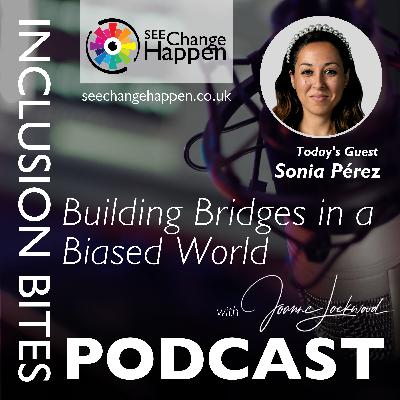
 Published: 01.08.2025
Published: 01.08.2025 Duration:
Duration: 

